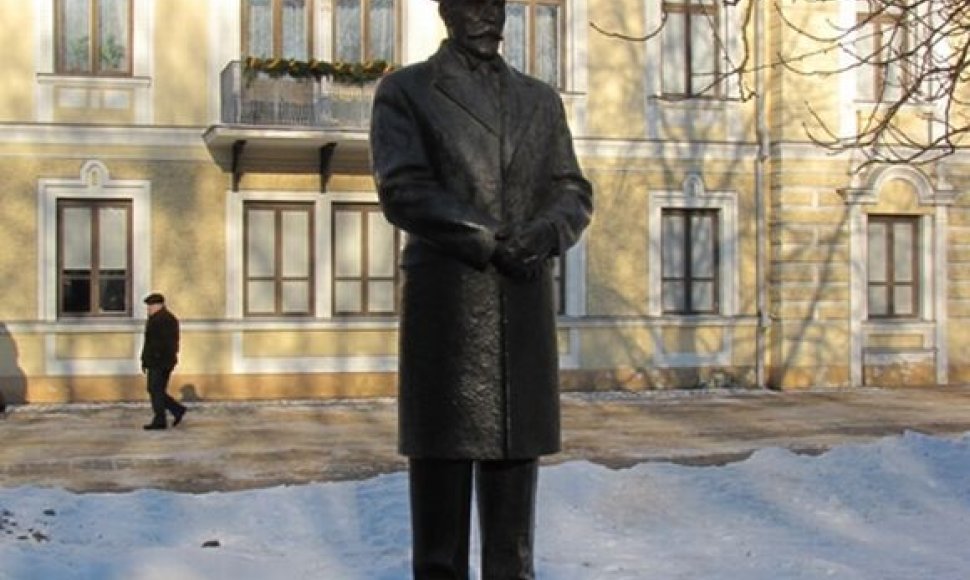As people started to build independent Lithuania, they likewise set out to lithuanianize her. The process of lithuanianization did not avoid its excesses – attacks against foreign citizens. It was not only the Holly See delegate A.Zecchini who voiced great indignation in his reports to Vatican, but also President Antanas Smetona who never approved of attacks against Jews and Poles.
Read beginning of the chapter Lithuanian Poles and Antanas Smetona, "King of Jews" (I)
The same [House of Commerce 1939] bulletin urged to define a policy for Jews in Vilnius region, saying that it was unacceptable to leave the most profitable industry – commerce – in Jewish hands, that they needed to be resettled [from the newly-regained Vilnius] and not to other towns, but to rural settlements, to work in agriculture; Lithuanians, it said, had to stop valuing only land: “If we want to live, let's divide up the towns and shove Jews into the country where they in specia are bound for extinction, because they will not manage to do hard and decent work. The gain will be two-fold: Jews will be pushed into passive and prospectless rural existence and put on the verge of extinction.”
This was a very open and Nazi-like incitement – Smetona's government policies never included such drastic measures.
Having regained our state, we want and we must be just in dealing with our minorities. Since we do not demand them to melt, to drown within our nation, we grant them the right to a native tongue, allow them to associate with their own kind in matters of culture.
Smetona had cooperated with Jewish colleagues under the Tzar, during election to the Russian Duma; Jews participated in the Council of Lithuania. So when the 1922 Constitution was being discussed, Smetona supported provisions granting cultural autonomy for national minorities, yet opposed privileges, creating “states within a state.” He protected the status of Lithuanian as a state language, often speaking out against derogations and persecution of minorities, urging to respect their culture: “Having regained our state, we want and we must be just in dealing with our minorities. Since we do not demand them to melt, to drown within our nation, we grant them the right to a native tongue, allow them to associate with their own kind in matters of culture. In exchange, they must be our land’s – therefore, territorial – patriots, love Lithuania and respect the Lithuanian people. They must be loyal to Lithuania, stick to the laws not out of coercion, but out of conscience. Therefore, our national minorities are not aliens, but fellow citizens, not foreign-ethnic, but different-ethnic.”
Smetona, himself a member of a small nation, was sensitive to problems of the small ones (back in1913, he wrote in a publication called “Hope” that nationalism had two sides to it: “Nationalism of the stronger nation turns into chauvinism, that of the weaker – patriotism.”).
“A small nation, of course, is not equal to a big one, one race is not equal to another, but does it follow from this inequality that a nation must slave for another or disappear altogether? The Egyptians are not Aryans, but no one can deny the greatness of their culture. Japanese are a yellow race, but their might today is indisputable, their culture is deep and special. Jews are Semites, a tiny nation that used to live around Palestine, and what giant impact have they made on mankind. They gave us the Holly Scriptures that touched all nations of the world. Which corner of this earth lacks a Bible? None. A tiny nation of Norwegians – and they have given so many brilliant people, authors, and musicians. (...) In proportion, small nations can easily match big ones creatively, in the arts, sciences, technology. Diversity and not unification is the mover of cultural progress,” Smetona said in a congress in 1935.
Neither Smetona, nor his party, Lithuanian Nationalist Union (LTS), promoted racism or antisemitism, even though some groups would hold occasional nationalistic actions or smear Jewish shop windows and doors. Among the most aggressive attackers against Jewish traders were their Lithuanian competitors, businessmen, and their publication “Verslas” (“Business”). Meanwhile, Smetona and LTS leadership always maintained close ties with Jewish financiers and trading groups.
In Jewish press and literature, Smetona was depicted as an incredibly tolerant Lithuanian politician – an image that prompted bitter Lithuanian radicals to dub him the “King of Jews.”
If there is any basis for the claim that the Lithuanian tradition does not recognize antisemitism, then it should not surprise us that Mr Smetona, who has both his feet in the historic soil of his nation, is untouched by either antisemitism or chauvinism.
In 1932, Izidorius Kisinas authored a book for Jewish pupils called “Antanas Smetona, President of the Republic of Lithuania,” published in Hebrew in Vilkaviškis. According to Kisinas, “if there is any basis for the claim that the Lithuanian tradition does not recognize antisemitism, antisemitism as a dominant social current, then it should not surprise us that Mr Smetona, who has both his feet in the historic soil of his nation, is untouched by either antisemitism or chauvinism (if, regretfully, such phenomena have been observed lately, then the influence of Mr Smetona and the better part of the Lithuanian society is our guarantee that trends within certain groups will not stray us away from the historic path (...) and good Lithuanian-Jewish relations).”
However, Smetona's attitudes were completely different regarding the Jewish left and those Jews who participated in Lithuania's revolutionary movement, active members of the Communist Party and communist underground. Perhaps it was the Jews – who preferred speaking other languages (not Lithuanian) – that Smetona intended this remark, uttered in the LTS convention on 5 January 1935: “I could reprove one minority group for having within their ranks those who have not shown due respect for the national Lithuanian language. Not having mastered it properly, they like using one of our neighbours’ languages in public. This habit turns majority of the population against it.”
Smetona expressed an uncomplicated understanding of the relation between the Lithuanian nation and the others: “Lithuanians are builders of their state, while national minorities are their aides, they must love Lithuania and respect the Lithuanian nation, be loyal to Lithuania.” His magnanimity, however, was not extended to all Jews. As B.Ivanov notes, the nationalist press mostly reflected the strategy of integration for national minorities, i.e., questions of their loyalty, since nationalists paid much attention to Jews and tried nurturing a highly differentiated image for them, distinguishing among various groups on the basis of national and public loyalty.
Nationalists would put loyal Jews into two main categories: Zionists and religious Orthodox Jews that presented no serious challenge in terms of public loyalty. It was based on certain Jewish sense of honour, interpreted as national self-consciousness, reliability, fairness, usefulness to Lithuanian nationalism and nationalists. The kind of Jew who would not shun spilling blood in Palestine, whom the Lithuanian environment nurtured into a modern man in terms of national feeling. Lithuanians themselves, it was claimed, could learn national consciousness from him.
The nationalists' attitudes towards Jewish politics were rather inconsistent – they approved of the Jewish role and support in dealing with Klaipėda and Vilnius questions. Meanwhile their wish to participate in municipal and later parliamentary elections was deemed an “unjustified” ambition to further expand their influence.















